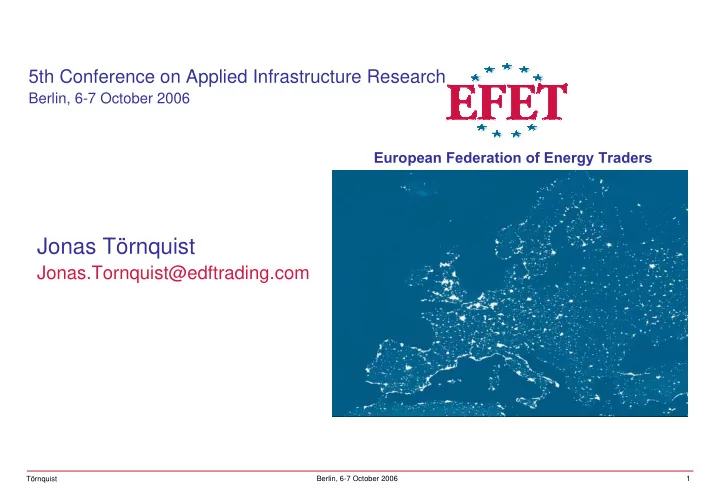

5th Conference on Applied Infrastructure Research Berlin, 6-7 October 2006 European Federation of Energy Traders Jonas Törnquist Jonas.Tornquist@edftrading.com Berlin, 6-7 October 2006 1 Törnquist
Firmness � Cross border transmission capacity rights should be firm , maximised and tradable in secondary markets � Firm capacity rights means that if capacity is curtailed compensation is paid at the full market spread (unless in cases of tightly defined force majeure) � Firmness is important and feasible because: � It is essential for proper market functioning � TSOs are the only natural sellers of transmission capacity � Offering firm capacity does not significantly increase TSO businesses risk Berlin, 6-7 October 2006 2 Törnquist
Market functioning � It is vital to ensure firms can hedge their (primarily) long-term positions through buying firm capacity rights � Capacity rights must be contractually binding and span months to several years to become truly tradable � In practise, market participants cannot hedge risks only through financial solutions (e.g. CFDs or FTRs) because: � No market participant (apart from the TSOs) can manage the risks involved in issuing such hedges for transmission risks � Most market participants need to buy hedges, not sell them. This creates a one sided market (only buyers and no sellers) � A primary supply is needed so trading of financial contracts take place on the back of physical contracts � Nordpool is an example of the financial solution not working Berlin, 6-7 October 2006 3 Törnquist
TSOs are natural sellers � TSOs are the only players in the market that can offer hedges through fully firm cross border transmission capacity � TSOs are natural sellers of transmission capacity, because: � Income is proportional to congestion and potential costs if there is a need to curtail (TSOs are long transmission while all other market players are short transmission) � TSOs have other ways to manage the risks Berlin, 6-7 October 2006 4 Törnquist
Firmness does not significantly increase TSO business risk � TSOs receive revenues from selling (long term) capacity that can be used to buy back capacity short term if required � TSOs only need to buy back capacity if they curtail or misjudge capacity availability � Revenue is proportional to potential curtailment costs (increases if a border is more congested) � TSOs have other ways of managing the risks � TSOs would only bear a small residual risk of the market significantly mis-pricing congestion Berlin, 6-7 October 2006 5 Törnquist
Example using real 2002-2005 data � If a TSO sells fully firm capacity one year ahead... …and then buys back 100% of that capacity for 100% of the days over the whole coming year ⇒ A net result of a small profit to the TSO � Of course this simple example contains very cautious approximations: � TSOs only need to buy back a small fraction of the capacity for a small part of the year � Re-dispatch instead of curtailment may be cheaper � Other technical options may be available to manage the congestion rather than automatically curtailing cross border capacity � The TSO can build new lines to manage long term congestion � If capacity available increases then the price differentials and spikes will also be reduced Berlin, 6-7 October 2006 6 Törnquist
Example using real 2002-2005 data Average price of capacity (2002-2005) per border (€/MWh) 10 9 8 7 Yearly 6 5 Monthly 4 Daily 3 2 1 0 TenneT - E.ON E.ON - TenneT E E - TenneT Elia - TenneT TenneT - Elia DK1 - D D - DK1 F - UK UK - F TenneT - RW RW Berlin, 6-7 October 2006 7 Törnquist
Example using real 2002-2005 data Average price of capacity (Nl-D, Nl-B, Dk-D, F-UK) per year (€/MWh) 5.00 4.50 4.00 3.50 3.00 Yearly 2.50 Monthly Daily 2.00 1.50 1.00 0.50 0.00 2002 2003 2004 2005 2002-2005 Berlin, 6-7 October 2006 8 Törnquist
Example using real 2002-2005 data Average price of capacity (Nl-D, Nl-B, Dk-D, F-UK) per year (€/MWh) P Y ≈ P M ≈ P D 5.00 4.50 4.00 3.50 3.00 Yearly 2.50 Monthly Daily 2.00 1.50 1.00 0.50 0.00 2002 2003 2004 2005 2002-2005 Berlin, 6-7 October 2006 9 Törnquist
Törnquist Capacity maximisation R WE - Tennet (NTC) 1000 1500 2000 2500 500 0 01/01/2002 01/04/2002 01/07/2002 01/10/2002 01/01/2003 01/04/2003 Berlin, 6-7 October 2006 01/07/2003 01/10/2003 01/01/2004 01/04/2004 01/07/2004 01/10/2004 01/01/2005 01/04/2005 01/07/2005 10
Capacity maximisation Average profit / loss versus percentage capacity buyback ( 2 0 0 2 - 2 0 0 5 ) 1.5 Profit / Loss of total annual 1 auctions revenue 0.5 Monthly 0 Daily 0 0.5 1 1.5 2 2.5 3 -0.5 -1 -1.5 Buy Back Berlin, 6-7 October 2006 11 Törnquist
Capacity maximisation � Revenues should (in priority order) be used to 1. Ensure firmness 2. Manage congestion (i.e. rescheduling or buying back capacity sold to the market) 3. Upgrade lines Revenues should only as a last resort be � used to reduce grid fees Incentives regulation must allow TSO’s to � benefit from doing a good job Berlin, 6-7 October 2006 12 Törnquist
Rough financial incentive scheme Incentive scheme A Incentive scheme B 10 TSO incentive payment [€ million] 8 6 4 2 0 -2 0 20 40 60 80 100 -4 -6 -8 -10 Net TSO revenue [€ million] Berlin, 6-7 October 2006 13 Törnquist
Concluding remarks � TSOs have a vital role in facilitating market functioning and competition by ensuring firmness and maximisation � Some issues can be progressed immediately – e.g. implement a priority order for use of auction revenues and publish detailed information about how auction revenues have been used � Others issues require discussion between TSOs and regulators (e.g. incentives) Berlin, 6-7 October 2006 14 Törnquist
Thanks for your attention European Federation of Energy Traders Amstelveenseweg 998 1081 JS Amsterdam Tel: +31 (0)20 5207970 Email: secretariat@efet.org www.efet.org Berlin, 6-7 October 2006 15 Törnquist
Recommend
More recommend